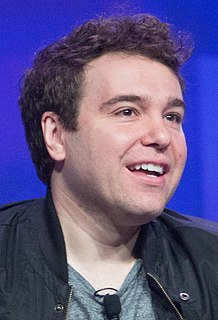A Quote by Erik Prince
I like the fact that Donald Trump has been in the private sector. I like that he's had to make a payroll. I like that he's had to do projects.
Related Quotes
The Obama administration was filled with people that had deep resentment for people successful in the private sector, in business or what have you, with no way of understanding them or relating to them at all, and no desire to. Much of the Washington establishment, particularly the Democrat side of it, has the same view of American business and the private sector. And here comes Donald Trump entering their world, and they are not equipped to understand how he operates or what he's doing. They're plugging him and his business techniques into their political models, and it doesn't work.
In fact, I lost my dad at a young age and had to put myself through school. I didn't have a lot of the advantages Donald Trump had but I had the most important ones you can get, which are loving parents who cared about me and helped me develop a sense of self. But it certainly wasn't Donald Trump's doing.
Al Gore's problem, in my view, is that he never liked politics. He's actually deeply uncomfortable in it but felt he had to do it because of his father. He's much more comfortable in a private sector role and has, in fact, been much more successful in a private sector role, and I admire him for that.
The election of Donald Trump is, to me, this very clownish personality with no political experience, who had literally been using fascist slogans in his campaign. It had seemed so impossible. Even after he was elected, and even now, it still feels impossible. It felt like we had fallen into this wormhole of history.
Actually, there was one sequence but Liv didn't put this in but at the end of the movie, we ran out of money. Literally, ran out. And I couldn't make payroll. So I emptied all our accounts to make payroll. We were kinda like, "What do we do?" Then out of the blue, we were saved by Gucci. So it's always been like, you just gotta reach for the stars and hopefully the moon will catch you.
Out of the house and on my own, I faced the fact I didn't much like who I was. I didn't like my judgmentalism; I didn't like my absolutism. I didn't like my repression of natural empathy, my pinched lack of emotional generosity. How I had been thinking politically had less to do with what was wrong with the world and more to do with what was wrong with me, with my fears and insecurities, failings, weaknesses.
The Republicans don't want Donald Trump to define the Republican Party agenda. They are very loyal. They owe a lot to their donors. The donors hate Trump. The Chamber of Commerce hates Trump. All of these people that the Republicans think they can't get elected without don't like Trump. So it has been a stonewall. This behavior by the House and Senate Republican leadership isn't anything new. All you had to do was to listen what they were saying during the campaign.
Donald Trump's election was a watershed moment. Even those like me, who had previously pulled levers for candidates of both parties, felt that Mr. Trump had not only violated all sense of common decency, but, alarmingly, that he seemed to have no idea that there even existed such an unspoken code of civility and dignity.
Donald Trump talks to a lot of people. That doesn't change his ultimate views. If you go back on YouTube and you look at Donald Trump talking about trade in the 1980s, in the 1990s, this is the same person today. He's no different. So, while a lot of people like to talk and argue about who's talking to President Trump and who's influencing him to make decisions, it's Donald Trump. It's his agenda. It's always been his agenda. And it always will be his agenda.


































